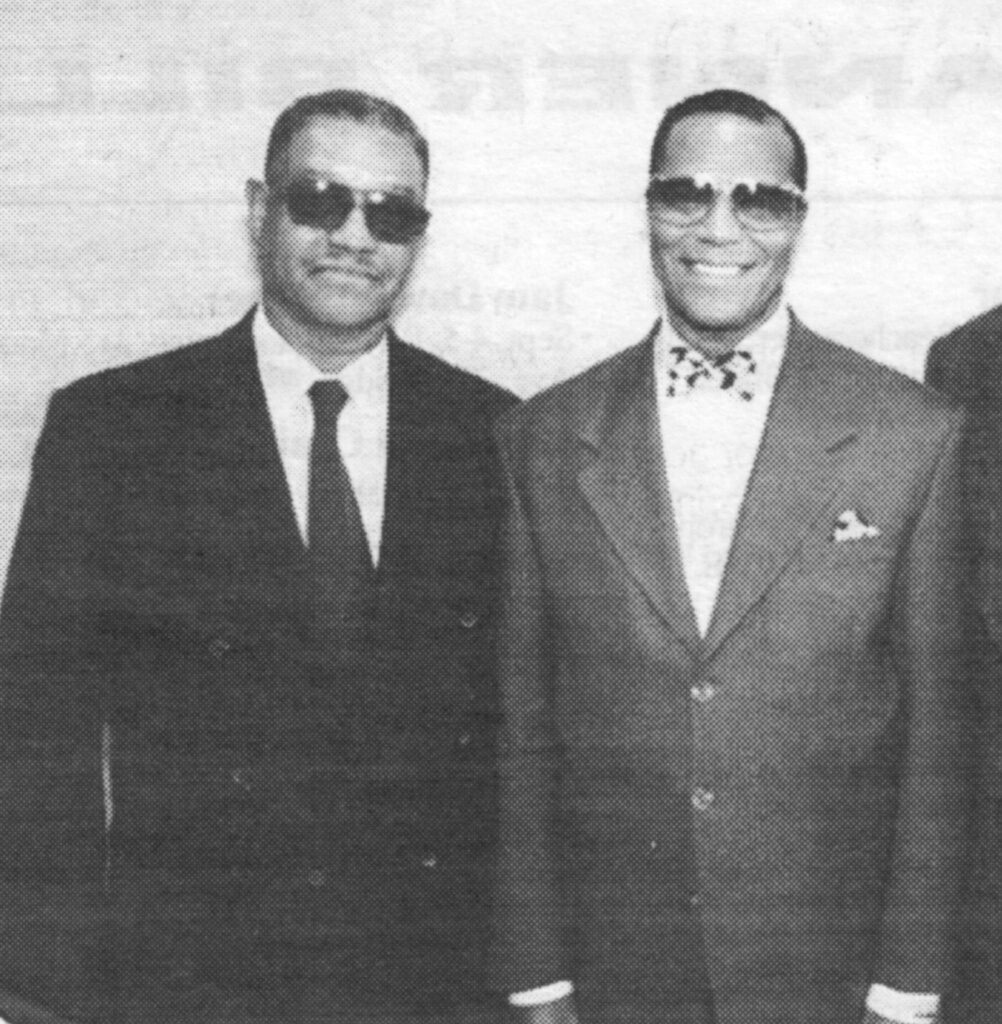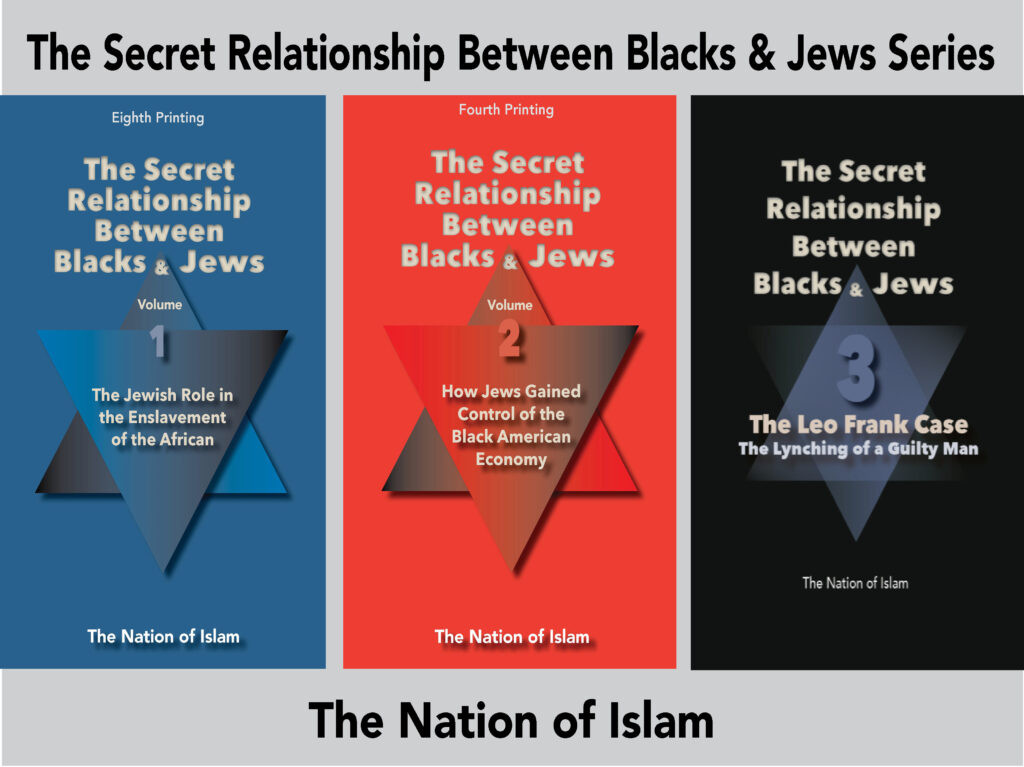Jews, Black Slavery, and the Boston Globe, Min. Don Muhammad
By Minister Don Muhammad, Muhammad Mosque #11

JEFF Jacoby’s caustic and libelous attack on Professor Tony Martin and the Nation of Islam (“Bigoted man on campus,” Boston Globe, 2 July 2001) for teaching the actual history of Blacks and Jews only demonstrates that a breathtaking and pervasive ignorance still exists among the opinion manipulators at the Globe and in the white media.
Jacoby used a series of sleight-of-hand moves common to his ilk to make his “case,” but Blacks should choose to educate themselves rather than partake in the cheap and racist vilification for which the Globe is widely known.
In contention is the history and extent of slave-dealing among the Jews in the Western Hemisphere during the colonial period. Some, like Jacoby, claim there is no such history, and that mere reference to it is ipso facto “anti-Semitism.”
Jacoby, who does not claim to be a historian, cites as authorities Harvard’s Henry Louis Gates and Wellesley College’s Selwyn Cudjoe — both of whom are Black, but, surprisingly, not historians. On the other hand, Prof. Tony Martin, Ph.D, also of Wellesley, is in fact a historian, and the only actual historian named in Jacoby’s diatribe.
Dr. Martin, a Black man, claims that Jews were indeed involved in the African-slave trade and that their role was significant—a position also endorsed by the Nation of Islam. Surprisingly (maybe even shockingly to some), Martin and the Nation of Islam use only historians in support of their position—and only Jewish ones at that.
Based on a careful review of the scholarly literature on “New World” Jewish history by Jewish historians (Jacoby, Gates, and Cudjoe have published nothing on the subject), here is what we do know about Jews in the slave trade:
- Lee M. Friedman, a one-time president of the American Jewish Historical Society, wrote that in Brazil, where most of the Africans were actually shipped, “the bulk of the slave trade was in the hands of Jewish settlers.”
- Jewish scholar Dr. Arnold Wiznitzer is most explicit about Jewish involvement in Brazil: “Besides their important position in the sugar industry and in tax farming, they dominated the slave trade….The buyers who appeared at the auctions were almost always Jews, and because of this lack of competitors they could buy slaves at low prices.“
- Author Marcus Arkin wrote in his book _Aspects of Jewish Economic History that the Jews of Surinam_ used “many thousands” of Black slaves.
- Rabbi Herbert I. Bloom wrote in his book, The Economic Activities of the Jews in Amsterdam, that “the slave trade was one of the most important Jewish activities here (in Surinam) as elsewhere in the colonies.” He even published a 1707 list of Jewish buyers by name with the number of Black humans they purchased.
- British Jewish historian Dr. Cecil Roth, writer of 30 books and hundreds of articles on Jewish history, wrote in his book History of the Marranos that the slave revolts in parts of South America “were largely directed against [Jews] as being the greatest slave-holders of the region.”
- “I gather,” wrote Jewish scholar Wilfred Samuels, “that the Jews [of Barbados] made a good deal of their money by purchasing and hiring out negroes…” He wrote that all Barbadian Jews owned slaves, and even the rabbi had “the enjoyment of his own two negro attendants.”
- Isaac and Susan Emmanuel report in their book History of the Jews of the Netherland Antilles that in Curaçao, which was a major slave-trading depot, “the shipping business was mainly a Jewish enterprise [and] [a]lmost every Jew bought from one to nine slaves for his personal use or for eventual resale.”
On Jewish slave-dealing in America, there is also no shortage of troubling evidence:
- Rabbi and historian Bertram W. Korn reported of the case in the 1830s, when Levy Jacobs of New Orleans was outraged at a rumor that claimed he was selling Kentucky-bred slaves. Jacobs took out an ad in the local paper to assure his potential customers that he would in the future keep for sale no other than “Virginia born negroes, of good character.” Rabbi Korn, the acknowledged expert on 19th-century American Jewry, observed, “It would seem to be realistic to conclude that any Jew who could afford to own slaves and had need for their services would do so….Jews participated in every aspect and process of the exploitation of the defenseless blacks.”
- According to the “Dean of American Jewish History,” Dr. Jacob Rader Marcus, the two largest slave cargoes brought into New York between 1800 and 1850 were brought in by Jew Nathan Simson. Marcus laments in one of his many works that “very few Jews anywhere in the United States protested against chattel slavery on moral grounds.”
Others have revealed that in Newport, Rhode Island, the center of the rum and slave trade, all Jewish families owned Black slaves; the Touro synagogue was built by Black slaves “of some skill”; and of the 22 distilleries serving the slave trade all 22 were owned by Jewish merchants.
The sad reality is that one can go on and on without much difficulty in enumerating the extensive involvement of Jews in the Black-slave trade. Actually, one is hard-pressed to name one (just one) prominent colonial American Jew who did not own slaves. He will have the same difficulty as the Anti-Defamation League had in their 1976 pamphlet entitled, American Jews: Their Story. The ADL lists 13 pioneers of the American Jewish community — 10 of whom have been definitively linked to the slave trade! All of these Jewish sources and many more have been collected and quoted in the Nation of Islam’s 334-page The Secret Relationship Between Blacks and Jews Vol. 1, for all to see and evaluate.
The book uses Jewish wills, rabbinical sermons, runaway slave and slave auction ads, port records, court records, private correspondence, among its array of source materials. Even with this wide-ranging use of Jewish documentation, University of Chicago African Studies professor and Jew Ralph A. Austen has written that “[t]he authors of The Secret Relationship underestimate the structural importance of the Jews in the early stages of the New World slave trade.”
The most blistering hypocrisy, however, is Jacoby’s refusal to repudiate, condemn, or in any way rebuke these Jewish historians with terms he uses to denounce Black ones. Dr. Marc Lee Raphael, for instance, is the editor of American Jewish History, the journal of the American Jewish Historical Society at Brandeis University in Waltham, Massachusetts. On page 14 of his 1983 book Jews and Judaism in the United States, Dr. Raphael wrote in two paragraphs a more definitive statement on Jewish slave-dealing than anything Professor Martin has ever written. The entire two paragraphs bear quoting:
“Jews also took an active part in the Dutch colonial slave trade; indeed, the bylaws of the Recife and Mauricia congregations (1648) included an imposta (Jewish tax) of five soldos for each Negro slave a Brazilian Jew purchased from the West Indies Company. Slave auctions were postponed if they fell on a Jewish holiday. In Curacao in the seventeenth century, as well as in the British colonies of Barbados and Jamaica in the eighteenth century, Jewish merchants played major role in the slave trade. In fact, in all the American colonies, whether French (Martinique), British, or Dutch, Jewish merchants frequently dominated.“This was no less true on the North American mainland, where during the eighteenth century Jews participated in the ‘triangular trade’ that brought slaves from Africa to the West Indies and there exchanged them for molasses, which in turn was taken to New England and converted into rum for sale in Africa. Isaac Da Costa of Charleston in the 1750’s, David Franks of Philadelphia in the 1760’s, and Aaron Lopez of Newport in the late 1760’s and early 1770’s dominated Jewish slave trading on the American continent.”
Being a Jew and a rabbi, Dr. Raphael is obviously shielded from any public rebuke or even from any questioning by Jacoby’s cheap inquisition. For merely agreeing with Raphael, the Black Prof. Tony Martin is subject to the libelous invective of this pompous Globe ignoramus (pardon the redundancy).
This racial double standard, and the price Professor Martin must pay in having to endure the insults and persecution of these blustering Nazi crackers, is what we call the Black Tax. Jewish tax collectors like Jacoby are what we call racists.
Despite the incessant Jewish onslaught and the white reign of terror against the forces of truth and historical accuracy, Prof. Tony Martin’s classes at Wellesley are among the most well-attended and popular. Prospective Black students are even seeking out his courses to include in their educational experience.
As the world’s foremost expert on the Marcus Garvey movement and author or editor of more than a dozen books, including the classic and monumental Race First, Professor Martin is one of the Black community’s most honored and respected scholars—and has been for decades. This is due, in large part, to his being the embodiment of the most cherished qualities in the field of history—a discerning and potent analytical mind, a respect for the scholarship of others in the field, and a dogged insistence that the truth cannot be bought and sold—even if hacks like Jeff Jacoby don’t like it.![]()
—Minister Don Muhammad, Nation of Islam
For more on this topic see the Nation of Islam book series The Secret Relationship Between Blacks & Jews. Download the free guide by clicking here.
To purchase the series click here.

